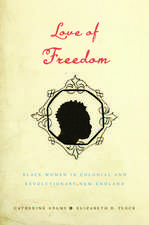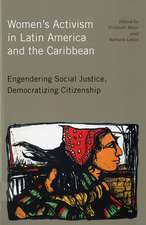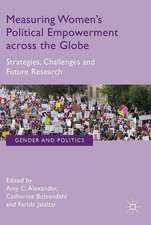Women Presidents of Latin America: Beyond Family Ties?
Autor Farida Jalalzaien Limba Engleză Hardback – 11 sep 2015
While providing valuable insight into the big picture of women in presidential politics throughout Latin America over the last several decades, this book more closely analyzes four women presidents gaining office since 2006: Michelle Bachelet (Chile) Cristina Fernández (Argentina) Laura Chinchilla (Costa Rica) and Dilma Rousseff (Brazil). It assesses the paths and impacts of Latin American women presidents and scrutinizes the ways gender shapes both aspects. No other scholar has offered such an in-depth analysis of the paths and actions of women presidents of Latin America. As such, this book offers important contributions to the gender in politics literature. Its multi-methodological approach consisting of original data collection from field work and in person interviews of political elites and experts combined with an analysis of a host of secondary sources including media articles and public opinion data makes this work exceptionally comprehensive. Its findings are applicable to those studying women, gender, and politics as well as comparative politics, Latin American politics, and leadership studies.
| Toate formatele și edițiile | Preț | Express |
|---|---|---|
| Paperback (1) | 413.33 lei 43-57 zile | |
| Taylor & Francis – 20 aug 2015 | 413.33 lei 43-57 zile | |
| Hardback (1) | 1002.63 lei 43-57 zile | |
| Taylor & Francis – 11 sep 2015 | 1002.63 lei 43-57 zile |
Preț: 1002.63 lei
Preț vechi: 1222.73 lei
-18% Nou
Puncte Express: 1504
Preț estimativ în valută:
191.87€ • 199.10$ • 160.37£
191.87€ • 199.10$ • 160.37£
Carte tipărită la comandă
Livrare economică 17-31 martie
Preluare comenzi: 021 569.72.76
Specificații
ISBN-13: 9781138782709
ISBN-10: 113878270X
Pagini: 284
Ilustrații: 11 black & white illustrations, 45 black & white tables, 11 black & white line drawings
Dimensiuni: 152 x 229 x 23 mm
Greutate: 0.61 kg
Ediția:1
Editura: Taylor & Francis
Colecția Routledge
Locul publicării:Oxford, United Kingdom
ISBN-10: 113878270X
Pagini: 284
Ilustrații: 11 black & white illustrations, 45 black & white tables, 11 black & white line drawings
Dimensiuni: 152 x 229 x 23 mm
Greutate: 0.61 kg
Ediția:1
Editura: Taylor & Francis
Colecția Routledge
Locul publicării:Oxford, United Kingdom
Public țintă
PostgraduateCuprins
CONTENTS: 1. Introduction 2. Political Backdrops 3. Backgrounds and Campaigns 4. Leadership Styles, Policy Successes, and Challenges 5. Descriptive Representation 6. Symbolic Representation 7. Substantive Representation 8. Conclusions
Notă biografică
Farida Jalalzai is the Hannah Atkins Chair and Associate Professor of Political Science at Oklahoma State University. Her research analyzes the representation and behavior of women and minorities in politics and the role of gender in the political arena. She has published extensively on many topics including women national leaders, gender and Congress, gender and media coverage, and Muslim American political behavior and discrimination since 9/11.
Recenzii
"The authoritative comparative study of Latin America's new generation of female presidents, women who have had (and continue to have) a transformative impact on politics and government in their respective country."—Mark P. Jones, Joseph D. Jamail Chair in Latin American Studies & the James A. Baker III Institute for Public Policy's Fellow in Political Science, Rice University
Descriere
This book examines all Latin American female presidents to date, and in doing so, answer three main questions. First, what conditions allowed for a broadening of routes for women presidents in these specific locations and at this particular point in time? Second, do female presidents use their powers to enhance women’s representation? Third, does gender present a burden or blessing to women as they campaign for presidential office and as they exercise power?















